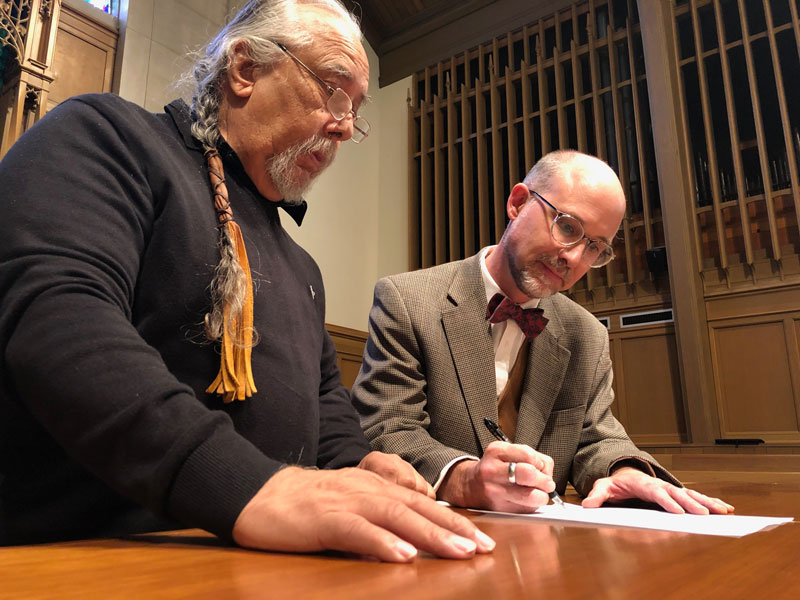Presbytery Gives Property to Indigenous Group
Presbytery Gives Property to Indigenous Group
Excerpt from Hudson River Presbytery transfers title of former church to Sweetwater Cultural Center by Noelle Damico for Presbyterian News Service.
On November 20, 2019, Hudson River Presbytery transferred the title of the former Stony Point Church and all its property to the newly created Sweetwater Cultural Center “to promote the education, health and welfare of indigenous or native peoples and to preserve their cultures and ceremonial practices locally, regionally, and around the Western Hemisphere.”
As soft afternoon light filled the sanctuary of White Plains Presbyterian Church, the small group of leaders representing the presbytery, the administrative commission of the Stony Point Church, and the Sweetwater Cultural Center joined hands around the Communion table and prayed. They prayed for the role that Sweetwater would have in the preservation of native culture and ceremony, for the educational programs Sweetwater would offer native and indigenous peoples and their allies, for the nurture of right relationship with the land, and for the sweetness of the moment in which Native tribal communities and the Presbyterian Church, affirming one another as partners, had begun writing a new chapter in history together.
“This gift is a pledge of partnership with our Native American neighbors that we will walk into God’s future together,” said Deborah Milcarek, general presbyter of Hudson River Presbytery.
“This gift has the potential to change everything,” said Chief Dwaine Perry of the Ramapough-Lenape Nation, the co-chair of Sweetwater Cultural Center. The Ramapough-Lenape Nation’s land encompasses parts of New Jersey and New York, where Hudson River Presbytery is located. “We are breaking new ground when Christians take real action to make amends for the harm that has been done to Native American and indigenous people.”
The transfer was the culmination of months of discussion within the presbytery and with Native American leaders in light of the presbytery’s commitment to helping Stony Point Church distribute financial assets in a way that would “honor the congregation’s legacy and commitment as a progressive, theologically grounded presence in their community,” and that would also align with the PCUSA’s formal repudiation of ‘the Doctrine of Discovery,’ which, in the name of God, had once claimed the lands of indigenous peoples for European colonization.
“This land return is profound for those of us who are natives given that we’ve lost so much: so much history, so many of our ancestors, so much of our culture and many of our tribes have lost our languages,” said Dee Ellenwood, a ruling elder at White Plains Presbyterian Church in Hudson River Presbytery and a member of the Nez Perce Tribe. “It does bring a lot of heartache to think of how much our ancestors have suffered and sacrificed, so to see some land being given back is beyond words…. I give God the glory for all that is being done.”
By design, the board of Sweetwater Cultural Center, which has a majority membership of native or indigenous persons, includes seats for at least two representatives of Hudson River Presbytery for the next ten years. This long trajectory of participation allows Presbyterians to continue to be partners in the adventure of Sweetwater and its groundbreaking work. That Sweetwater will be a site for continued worship and advocacy has many in the presbytery excited for how their congregations can participate in this adventure.
The Rev. Stephany Graham Walker said she was honored to be representing Hudson River Presbytery on Sweetwater Cultural Center’s Board. She said members of her church were excited to imagine what it could mean to be friends and partners in this new ministry. “There is much to learn and a lot of work to be done, but I am fully engaged with heart and hands,” she said.
Pastors of churches in Rockland County where Sweetwater is located were equally energized.
“I’m excited this is happening in our county,” said the Rev. Angela Maddalone, anticipating the opportunity for exchanges at Sweetwater that will deepen understanding and relationships. “This demonstrates, especially to young people, that the church does care and is making a difference on matters of real importance. With this small step we are participating in acknowledging and repairing harm that has been done to Native cultures and building a new future together. What a moment!”
This story is part of Lake Institute’s story collection, the Faithful Generosity Story Shelf, which highlights congregations and other religious organizations who have sought to use their assets and resources in creative—and sometimes surprising—ways as an expression of faithful giving.
Each entry in our Story Shelf is short enough to be read and discussed during a committee meeting or other group gathering. Our hope is that these accessible vignettes will spark new questions, conversation, and imagination among clergy and laity about what might be possible with the funds, buildings, land, and other resources in their care. If you know a story that should be included in the Story Shelf, suggest it here.
Subscribe
Insights, a bi-weekly e-newsletter, is a resource for the religious community and fundraisers of faith-based organizations that provides:
- Reflections on important developments in the field of faith and giving
- Recommended books, studies and articles
- Upcoming Lake Institute events

